| 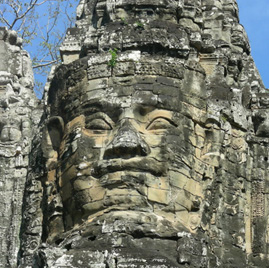
 Karen's Perspective on Traveling
Alone Karen's Perspective on Traveling
Alone






















|
I had seen leopards before but those were fleeting sightings, once in
South Africa and an early morning sighting in Uganda. After 10 years
and four safaris, this my fifth safari and in the Khwai area of
Botswana was the jackpot. A mother and one year old male cub were
enjoying the remains of an impala they had killed, underneath a large
bush where they could get out of the scorching heat. After ten
minutes, the mom came out from the bush to stretch out and digest.
Soon her cub also came out, urinated and then snuggled with his mom,
playing with each other the way all cats do, from domestic felines to
the large cats of the world. 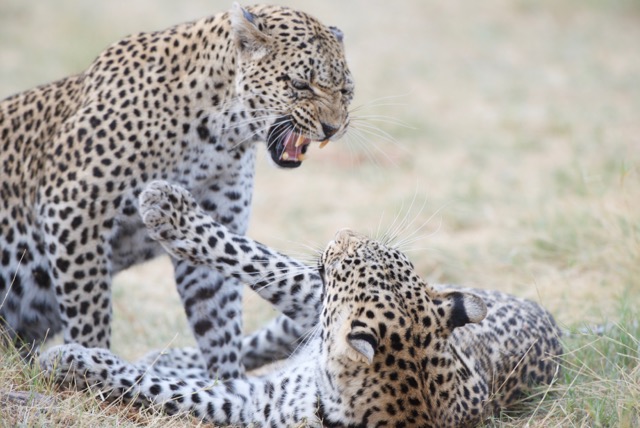 They tousled, turning each other over and
presumably gently biting and clawing each other. We were able to watch
their regal play for about an hour, and they seemed oblivious to the
homo sapiens so intent on photographing their every adorable
interaction. They tousled, turning each other over and
presumably gently biting and clawing each other. We were able to watch
their regal play for about an hour, and they seemed oblivious to the
homo sapiens so intent on photographing their every adorable
interaction.
I was on a 9 day safari with Ulinda Safaris, witnessing the
stunning beauty that is Botswana. Jane is the owner of Ulinda Safaris
and she has been leading groups in the area for 30 years. I was
exploring Botswana after a short stopover in Istanbul, still one of my
favorite cities in the world. The cheapest flights to Africa from the
U.S. are on Turkish Airlines since lots of folks are too scared to fly
the airline because of terrorist attacks in Turkey. Per capita, I'm
not sure that Turkey is any more dangerous that any European capital
or my home town of Oakland, CA. 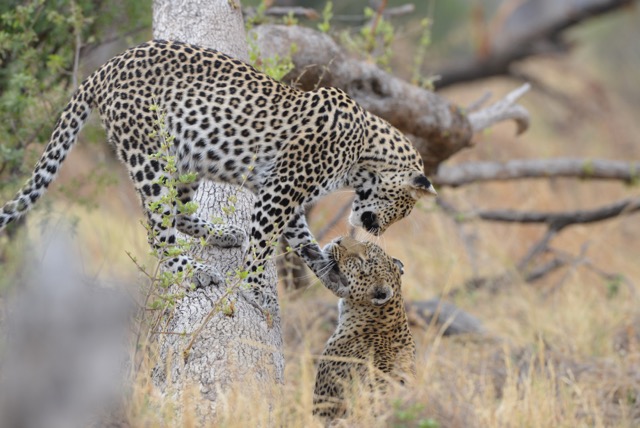 I had explored Istanbul as a tourist
with a women's tour group in 2002, so rediscovering where East meets
West on my own was a delight. I toured the de rigeur sights of the
blue Mosque and Haggia Sophia, and my reaction might not have been
very different than my earlier trip. In the Blue Mosque, I admired the
incredible architecture but my overwhelming reaction was a fantasy of
Muslim women in burkas and headscarves entering the "male only"
section of the mosque to hold hands in a circle and pray or sing for
peace or maybe just have a "sit-in." My reaction to any country or
culture that oppresses women is to have such detailed fantasies. When
I shared my idea the next morning over breakfast at my hotel with a
Muslim English father and his two teenage sons and 20 something
daughter, he assured me that the reason that the mosque is separated
into male and female sections is not to oppress or slight women in any
way but because men are "weak" and that if women were praying next
to the male, his thoughts would be "impure.' I had explored Istanbul as a tourist
with a women's tour group in 2002, so rediscovering where East meets
West on my own was a delight. I toured the de rigeur sights of the
blue Mosque and Haggia Sophia, and my reaction might not have been
very different than my earlier trip. In the Blue Mosque, I admired the
incredible architecture but my overwhelming reaction was a fantasy of
Muslim women in burkas and headscarves entering the "male only"
section of the mosque to hold hands in a circle and pray or sing for
peace or maybe just have a "sit-in." My reaction to any country or
culture that oppresses women is to have such detailed fantasies. When
I shared my idea the next morning over breakfast at my hotel with a
Muslim English father and his two teenage sons and 20 something
daughter, he assured me that the reason that the mosque is separated
into male and female sections is not to oppress or slight women in any
way but because men are "weak" and that if women were praying next
to the male, his thoughts would be "impure.'
Istanbul and Victoria Falls, Zimbabwe
I explained that I wasn't buying it and that maybe men should stay
home and worship in their own homes if they couldn't be with women
in a public space. The father was good natured and probably pretty
open minded since he worked for a government agency in Manchester. I
enjoyed a couple of nights staying at the Emile Sultan near the Blue
Mosque and watched the sun rise over the Bosphorus from my window. The
most memorable experience was a delightful fish dinner in a local
restaurant that featured a trip playing traditional Turkish music. The
musicians didn't speak English so we communicated by my enthusiastic
clapping and solo dancing. I love being the rich tourist when I am
able to honor such a group with a bountiful tip.
To fly to Botswana, one pretty much has to fly through Johannesburg
and I chose to augment my time in the area by flying into Victoria
Falls in the disastrous country of Zimbabwe. Mugabe has ruled the
country with an iron fist since 1987 and even though he is 93
years old, there seems to be no end of him in sight. Like many African
dictators of the past, he promised prosperity but the economy has
ended up in ruins. It is somewhat ironic that though he pretty much
forced most everyone not black to leave the country, Zimbabwe has now
adopted the U.S. dollar as its currency. Of course, many black
Zimbabweans have fled to South Africa and I met one very amiable
native on the flight to Johannesburg who is now a mechanic in the U.K.
The socialist legacy of Mugabe is certainly a mixed bag as the
Zimbabweans I met out of their own country seem to be well educated,
confident and friendly as is true of many immigrants all over the
world.
Arriving in the airport in Zimbabwe is a test of a Westerner's
patience. It took about about an hour for me to pass through customs
in a stifling room as every passport and visa must be written out by
hand. And why come to Zimbabwe at all? The answer of course is
Victoria Falls, one of the largest waterfalls in the world, draining
the Zambezi River. With temperatures in
the low 90's, I enjoyed the incredible spray from the falls, even
though it was running at perhaps 10% of its capacity as I visited at
the end of the dry season. Magnificent rainbows appeared above and
inside the falls and I fondly remembered past trips hiking the great
falls of the world, including Yosemite Falls, Iguacu Falls (Brazil and
Argentina) and of course Niagara Falls. Perhaps because I was born in
West Texas and never saw a huge waterfall except in Hawaii growing up,
I am pretty much overcome with delight at any large waterfall
cascading down a vertical fall. I always ponder how far and where did
the water I am seeing come from and where is it headed. In the case of
the Zambezi, the source is in Zambia and the water will flow into the Indian Ocean in Mozambique.
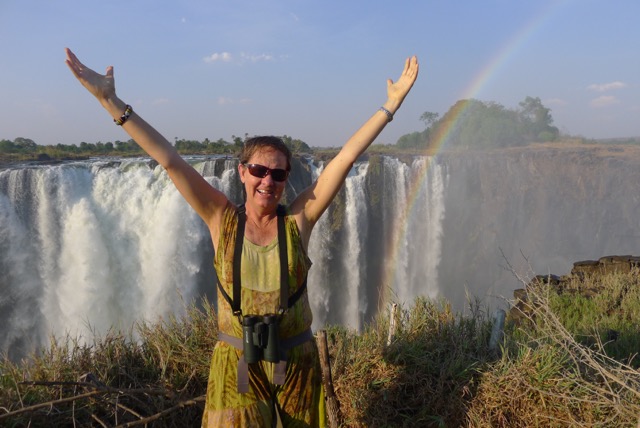 The following morning my guide Jane picked me up at my guesthouse and
we also picked up the two Belgians who would be my intimate companions
for the next 9 days. The couple were pleasant and fun but we never
became particularly close as I sometimes do with safari mates. Our
safari included 3 staff members, one of whom was an amazing female
cook and two men who set up the tents, watched the camp while we were
gone (protecting it from animals including vervet monkeys) and who
also helped serve dinner and clean up. This was my fifth camping
safari in Africa and all have been fairly simple and low budget. The
tents and bathrooms and showers on this tour were about par for the
course, simple but fairly comfortable, although sleeping on the ground
becomes a bit more challenging the older I become. What I love about
camping safaris is the proximity to the sounds and sights of birds
The following morning my guide Jane picked me up at my guesthouse and
we also picked up the two Belgians who would be my intimate companions
for the next 9 days. The couple were pleasant and fun but we never
became particularly close as I sometimes do with safari mates. Our
safari included 3 staff members, one of whom was an amazing female
cook and two men who set up the tents, watched the camp while we were
gone (protecting it from animals including vervet monkeys) and who
also helped serve dinner and clean up. This was my fifth camping
safari in Africa and all have been fairly simple and low budget. The
tents and bathrooms and showers on this tour were about par for the
course, simple but fairly comfortable, although sleeping on the ground
becomes a bit more challenging the older I become. What I love about
camping safaris is the proximity to the sounds and sights of birds 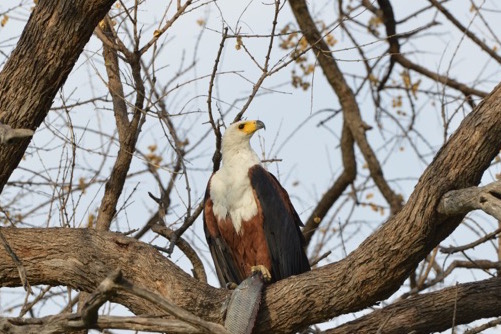 and
animals. Unfortunately, camping at the beginning of November in
Botswana was most challenging because of the extreme heat and dust. We
would watch the sun come up with our first tea and breakfast in the
morning and be up and out by 5:30am and return by 11am. From 11am-4pm
we suffered extreme heat and I learned the trick of wetting my sarong
and wrapping it around me for the relief of evaporation. Large trees
are scarce in Chobe National Park but we did our best to find them. It
did cool down at night to some extent but I slept nude with just a
sheet on most nights. But the long days of driving and heat are what
Botswana is comprised of in the Chobe area with the Chobe River a much
welcome ribbon of blue with a green belt surrounding it. and
animals. Unfortunately, camping at the beginning of November in
Botswana was most challenging because of the extreme heat and dust. We
would watch the sun come up with our first tea and breakfast in the
morning and be up and out by 5:30am and return by 11am. From 11am-4pm
we suffered extreme heat and I learned the trick of wetting my sarong
and wrapping it around me for the relief of evaporation. Large trees
are scarce in Chobe National Park but we did our best to find them. It
did cool down at night to some extent but I slept nude with just a
sheet on most nights. But the long days of driving and heat are what
Botswana is comprised of in the Chobe area with the Chobe River a much
welcome ribbon of blue with a green belt surrounding it.
On our first afternoon out we spotted three female lions with two cubs between
them, lying down and then walking as the sun set over the expanse of
this corner of pristine preservation. Botswana's economy depends a
great deal on tourism and it seems that lots of resources go into the
parks with the park fees high, as in other countries of East Africa.
Jane is a professional photographer so her photos are quite remarkable
and I have added some here. She is also a knowledgeable birder and
over the course of the safari I saw many of my favorites including the
lilac breasted roller, the kori bustard in mating plumage,
saddle-billed storks (in Khwai only) and 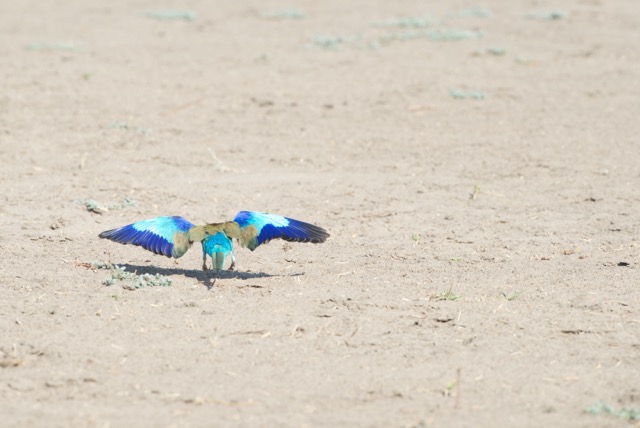 many Egyptian geese, African
fish eagles, sacred ibis, ground hornbills, among others. Besides the
leopard sighting, perhaps the other most remarkable event was a 6 foot
black mamba snake which passed in front of the truck and up a tree
where we got some photos. The black mamba (which I also saw in
Tanzania a few weeks later) is called the two step snake in Tanzania
as if bitten, you take one, then two steps before you perish! I'm
not particularly afraid of snakes, but this huge one gave me a little
and scary thrill. many Egyptian geese, African
fish eagles, sacred ibis, ground hornbills, among others. Besides the
leopard sighting, perhaps the other most remarkable event was a 6 foot
black mamba snake which passed in front of the truck and up a tree
where we got some photos. The black mamba (which I also saw in
Tanzania a few weeks later) is called the two step snake in Tanzania
as if bitten, you take one, then two steps before you perish! I'm
not particularly afraid of snakes, but this huge one gave me a little
and scary thrill.
Other dramatic animal encounters happened right inside our campground.
One night I awoke to the sound of lapping in the ablution pouch right
outside my tent. Hyenas were so thirsty that they had resorted to
drinking from the pouches. Another afternoon we were all reading and
napping under the dining tarp when two male elephants came into camp
and were eating the trees (I forget which kind). They continued to
come closer and closer with their sagging flesh and powerful trunks
until Jane started banging steel cups together, the way I shoo away
bears in the Sierras. I wasn't particularly afraid but I also know
that elephants can be dangerous and I know of instances when tourists
got too close trying to take photos and were stampeded or picked up by
a trunk and beaten to death. In this instance, we just sat still until
the majestic ones moved on. Knowing the horrible statistics about the
poaching of elephants and the real possibility that they could
practically disappear in my lifetime or by 2050 made this encounter
all the more special.
The best day of the trip was a boat ride on the Chobe River where our
pilot and guide circumnavigated a small island where we witnessed two
elephants cross the river, frolicking and spurting water on the
crossing. We also saw enormous monitor lizards and crocodiles and
quite a few hippos which of course are the most dangerous animal in
Africa for humans. I can spend countless minutes watching hippos as
they "eat, pray and love." As they submerge themselves in a river,
they contentedly enjoy the cool of the water, barely keeping their
eyes and funny little ears above water and then occasionally plunging
down for a total dunk.
One morning we also took a ride on the wooden canoes called makaro on
the Okavango Delta but it was so hot that it was hard to really
appreciate the experience as we didn't see anything we hadn't
already observed, except for a tiny tree frog. On the 4th day of the
safari, we had a long drive from one side of the park to another,
getting three flat tires (among 2 vehicles). As we arrived in Khwai, I
decided I needed a break from camping and booked a room at a lodge
inside the park that had AC and a large and somewhat cool verandah. I
had done this previously on camping safaris and again it was a great
relief to sleep in a real bed and not sit in the dirt. I met a fun
group of Americans, one of whom works for the park service at Crater
Lake as a biologist. After dinner the staff performed traditional
dance and song which was pretty delightful with at least one woman
making a throaty sound that is distinctively African, although many
cultures, including Balkan singing have same of the same piercing
accentuation. The next morning we left early in their open air jeep
and had two incredible experiences. 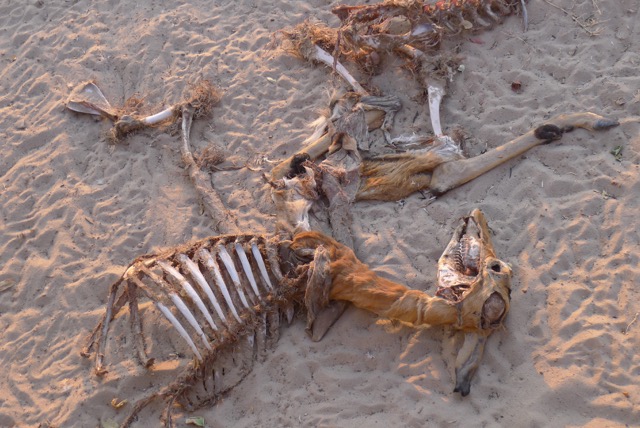 The first was a wildebeest kill by
a female lion during the night and now a group of 6 hyenas were
tearing the flesh apart. As we witnessed their feast, a female lion
sauntered up to them and meekly chased them for a few minutes but she
looked full and soon lay down nearby to watch them as she was out
numbered. The first was a wildebeest kill by
a female lion during the night and now a group of 6 hyenas were
tearing the flesh apart. As we witnessed their feast, a female lion
sauntered up to them and meekly chased them for a few minutes but she
looked full and soon lay down nearby to watch them as she was out
numbered.
Wild Dogs
The next sighting was the most memorable during my entire trip except
for the leopard sighting of the day before. Suddenly, our driver and
guide made a beeline for what seemed to be a bush among hundreds of
others. Only as we got within 20 feet could we see some ears poking
out. WILD DOGS! In my previous safaris, I has never been able to spot
this extremely endangered species which look like many smaller
domestic dogs, except for their unusually large ears. They are
exceptional hunters, taking turns as the front leader, to bring down
their prey. Now they were resting and we saw a pack of perhaps six
dogs with at least 4 puppies running out from under the bush but them
back in to form a puppy pile.
South Africa and the Free State
I arrived back in Johannesburg and rented a car to drive on the left side of the street, also shifting gears with my left hand. I had driven in South Africa a couple of times before in this manner so it isn't as hard as it seems. What was more difficult was finding my way even with the google maps printed out at the rental agency. This would have been the time to have sprung for extra cost of the GPS. Instead, I had to resort to asking folks on the street for directions and one chef in his white uniform told me to follow him and he must have gone out of his way by at least 15 minutes to be sure I got headed in the right direction. Even so, my google directions took me right into Soweto, presumably the largest township in the country with over a million inhabitants. I had toured there in 2005 and it was a fascinating place for its history of the Soweto Uprisings. But now I was trying to get to a small town called Parys to just spend the night. I drive right into a huge thunder and lightning storm, the enormous kind that I have only experienced growing up in West Texas and here on a previous trip when I was flying from Cape Town to Joburg. On that previous experience, I wondered what happened when a lightning bolt hits a plane as we seemed to barely dodge the bolts. Now I considered stopping by the side of road and waiting out the storm but I was impatient to get to a place where I could sleep. The next morning I confidently logged onto my laptop while having breakfast, expecting to see that Clinton had become president but the headline of the New York Times had me reeling. I literally gasped aloud when it looked like Trump would be the winner. South Africans all around me asked how it could possibly be true and I had no easy answers. I made my way to a little touristy town called Clarens with its quaint village green, art galleries, excellent eateries and a good bookstore.. It is set among the sandstone outcroppings of the Maluti mountains and I visited the nearby Golden Gate Highlands National Park with its eroded sandstone cliffs and a few wildlife sightings including zebra and eland. The difficulty with being a tourist in South Africa is the same as when I visited for the first time in 2005. Most blacks are poor and do the brunt of the work while most whites seem fairly prosperous. The Free State is known for being one of the most segregated provinces in all of South Africa. One black waiter I met told me he did not know of as a single black person that lived in Clarens proper, rather they all lived in the adjoining township which I watched all the blacks leave to after their work day was done.
While exploring the area around Clarens, I would pick up hitch hikers, mostly girls and older women. One morning I picked up two adorable girls in their school uniforms on their way to Ficksburg. 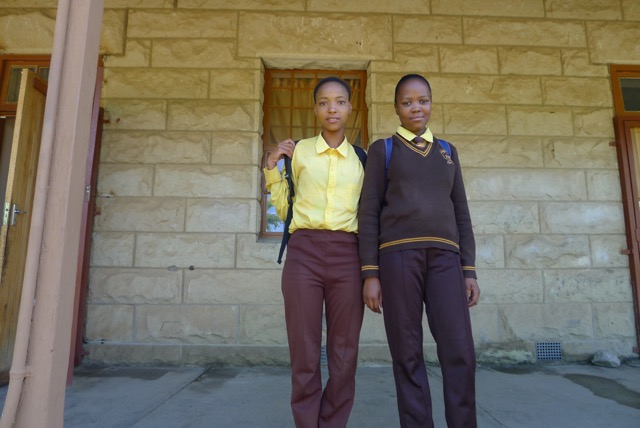 While driving I came across a large turtle in the middle of the road and stopped the car to pick it up and move it out of danger's way. When I dropped them off, I asked if I might meet their teacher and was shown into the principal's office. The principal barely spoke English but made it clear I couldn't go inside a classroom. He did however seem to enjoy having is photo taken with his poster of Mandela. The English teacher explained that the girls were taking exams that day and when I invited him to have breakfast, he demurred but agreed to come with me to point out the best breakfast in town before reporting back to his school. The area is famous for its peaches and I stopped at a roadside stand to enjoy some of the first crop of the season. Having been away from CA during the last peach season, these tasted unusually sweet. While driving I came across a large turtle in the middle of the road and stopped the car to pick it up and move it out of danger's way. When I dropped them off, I asked if I might meet their teacher and was shown into the principal's office. The principal barely spoke English but made it clear I couldn't go inside a classroom. He did however seem to enjoy having is photo taken with his poster of Mandela. The English teacher explained that the girls were taking exams that day and when I invited him to have breakfast, he demurred but agreed to come with me to point out the best breakfast in town before reporting back to his school. The area is famous for its peaches and I stopped at a roadside stand to enjoy some of the first crop of the season. Having been away from CA during the last peach season, these tasted unusually sweet.
It was time to move on to Drakensburg National Park in KwaZulu Natal province. The park lies along an enormous escarpment and I stayed for 2 nights in a rondavel (round room) at a delightful hostel called Inkosana with its great room full of international tourists relaxing after dinner by reading and conversing. I had a stimulating conversation with a 30ish woman from Luxembourg along with a 50ish South African. The impact of the Trump election was foremost in everyone's mind and our conversation veered from the fallout of the election in international relations to the merits or demerits of affirmative action, especially for women. I also chatted excitedly with a couple in their late 20's, he was South African/German and reading Noam Chomsky's Who Rules the World while his partner was a Croatian visual artist. It was the the kind of heart to heart sharing that can happen when traveling alone. I felt so stimulated by the conversations that I had a bit of trouble falling asleep that night. This was the reason I always love staying in hostels or small guest houses. The next morning the mountain was fogged in, but I hiked into the fog and met an older hiking club on the trail. The protea and jacaranda trees were blooming as spring was in full swing. Birds included a long tailed widow bird.
Next up was the village of Memel where a friend Steve Ablondi and his wife Cindy have started a sustainable living community where they employ around 10 South Africans and Zimbabweans to work the land and build guest houses. In addition, their project had just completed building a small cohousing community in the next door township, aimed at renting to local teachers as an incentive to provide quality housing. In addition, Memel Organics runs a non-profit, providing soccer instruction and empowerment for local girls, besides various other charitable projects. The gardens include various flowers and veggies and one stand of bamboo attracts the gorgeous red bishop as well as other weavers, busy building their nests. As we were eating dinner the first night, I got an expected call from my sister with the sad news that my 65 year old brother had died from a heart attack. I was glad to be staying with friends instead of strangers as I absorbed the news.
Safari in Tanzania
I cut my trip a bit short as I was headed to Nairobi to reconnect with my longtime friend Joseph 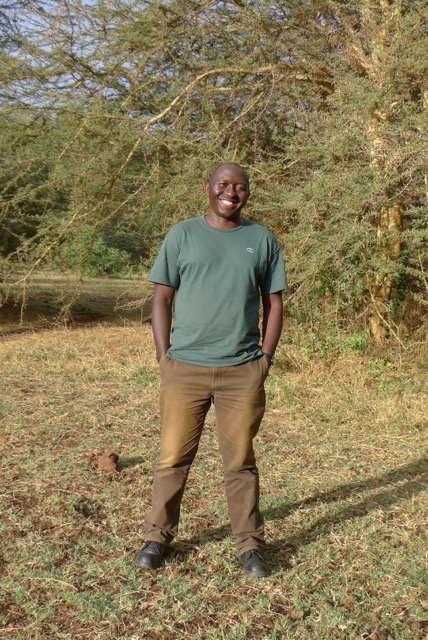 for a safari to Tanzania, retracing some of the places we had visited in 2007. This time we were staying in lodges instead of camping. After camping in Botswana though, I enjoyed the comforts that a lodge provides. Or maybe I am just getting older and less adventurous. Joseph was 45 minutes late picking me up at the airport because of a huge traffic jam which is entirely commonplace in this megalopolis. The next morning we bought some supplies before heading out to cross the southern border to Tanzania. Young men at the border crossing were eager to supply a few items that we needed for a "private" safari including a First Aid Kit and a fire extinguisher. All at a rate they proposed. I had hoped to get a glimpse of Kilimanjaro but no luck as Kibo was hiding her head in the clouds on the day we entered and also on our return. But we saw giraffes along the road right after we passed customs, almost as casually as one notices a stray dog in the U.S. What other sightings could be in store? We spent the next 2 nights in Arusha, staying in a lovely lodge high up on the outskirts of town. The highlight was a long hike I took with some local guides to a waterfall on Mt Meru, a sister mountain to the more famous Kilimanjaro. Most folks in Arusha seem to have a small plot of land on which they farm a few veggies or have some chickens or pigs. Most of the way, we passed these small plots until we rose above them to what must have been protected mountain land. We walked down now and crossed a small stream to arrive at an impressive waterfall where a group of students were enjoying the falls under the watchful eyes of some guards. The guards began speaking to my guides and clearly the conversation was not a pleasant one. for a safari to Tanzania, retracing some of the places we had visited in 2007. This time we were staying in lodges instead of camping. After camping in Botswana though, I enjoyed the comforts that a lodge provides. Or maybe I am just getting older and less adventurous. Joseph was 45 minutes late picking me up at the airport because of a huge traffic jam which is entirely commonplace in this megalopolis. The next morning we bought some supplies before heading out to cross the southern border to Tanzania. Young men at the border crossing were eager to supply a few items that we needed for a "private" safari including a First Aid Kit and a fire extinguisher. All at a rate they proposed. I had hoped to get a glimpse of Kilimanjaro but no luck as Kibo was hiding her head in the clouds on the day we entered and also on our return. But we saw giraffes along the road right after we passed customs, almost as casually as one notices a stray dog in the U.S. What other sightings could be in store? We spent the next 2 nights in Arusha, staying in a lovely lodge high up on the outskirts of town. The highlight was a long hike I took with some local guides to a waterfall on Mt Meru, a sister mountain to the more famous Kilimanjaro. Most folks in Arusha seem to have a small plot of land on which they farm a few veggies or have some chickens or pigs. Most of the way, we passed these small plots until we rose above them to what must have been protected mountain land. We walked down now and crossed a small stream to arrive at an impressive waterfall where a group of students were enjoying the falls under the watchful eyes of some guards. The guards began speaking to my guides and clearly the conversation was not a pleasant one. 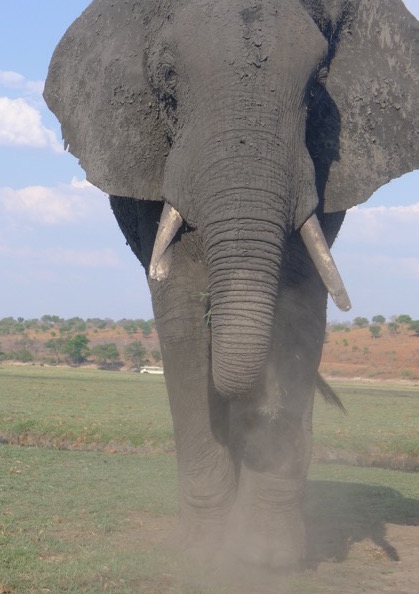 Apparently they insisted that the way we had arrived was not kosher and wanted us to exit a completely different direction. After listening to them for awhile I tried to explain in English that I was a paying guest and needed to head back the way we had come in.The guards were impassive so I did what I have learned to do in these situations. I just walked back the way I had come while they continued arguing. When my guide caught up with me he told me I was "fearless" and I laughed. Perhaps "fearless" to bureaucracy but mostly impatient. Apparently they insisted that the way we had arrived was not kosher and wanted us to exit a completely different direction. After listening to them for awhile I tried to explain in English that I was a paying guest and needed to head back the way we had come in.The guards were impassive so I did what I have learned to do in these situations. I just walked back the way I had come while they continued arguing. When my guide caught up with me he told me I was "fearless" and I laughed. Perhaps "fearless" to bureaucracy but mostly impatient.
For the next 5 days Joseph and I explored the national parks of Lake Manyara and Tarangire, choosing to forego famous Ngorogoro Crater as the price was astronomical to bring a private tour car in. Lake Manyara is a smaller park than many in Tanzania and enjoys an escarpment of the Rift Valley for its western border. Its huge lake is alkaline and we walked out over the lake on an impressive boardwalk to see hundreds of greater and lesser flamingos as well as whistling ducks and mammals such as elephants, giraffes and zebras. Each day in these parks we would pickup a local guide who would direct us to the best watering holes and viewpoints.
Last days in Africa are always bittersweet. I heard "karibu" (welcome) at least 50 times a day. A large fireball falling from the night sky was perhaps the most spectacle experience of all. (What was it?) 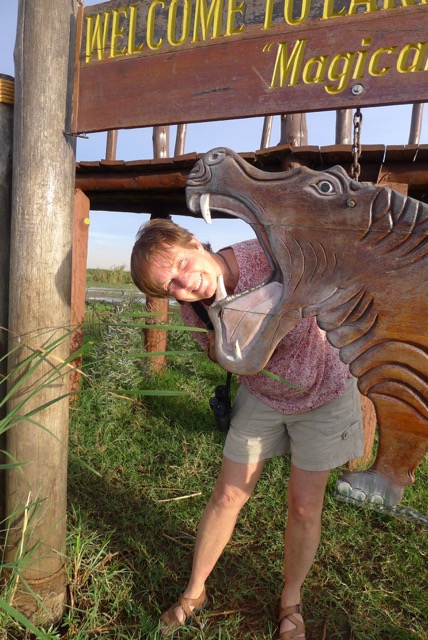 The smells, sounds, and sights of the wild--thousands of birds including hundreds of pink flamingos and thousands of white pelicans plus a special sighting of a relaxed juvenile leopard in a tree at Silale Swamp, Tarangire. Another black mamba and wilddebeests running through our camp our last morning made for a scene "Out of Africa." Even paying off the police for a trumped up charge of speeding was just part of the package. And my last night included a thunder and lightning storm that knocked the electricity off in my all time favorite guest house in the world (or at least Africa) called Macushla in Nairobi. And when I literally made my connection in Istanbul by two minutes so as not to miss my brother's funeral, I gave thanks for everything I had seen and especially for my strong legs that had allowed me to run through the airport, almost like the cheetah I could imagine being. The smells, sounds, and sights of the wild--thousands of birds including hundreds of pink flamingos and thousands of white pelicans plus a special sighting of a relaxed juvenile leopard in a tree at Silale Swamp, Tarangire. Another black mamba and wilddebeests running through our camp our last morning made for a scene "Out of Africa." Even paying off the police for a trumped up charge of speeding was just part of the package. And my last night included a thunder and lightning storm that knocked the electricity off in my all time favorite guest house in the world (or at least Africa) called Macushla in Nairobi. And when I literally made my connection in Istanbul by two minutes so as not to miss my brother's funeral, I gave thanks for everything I had seen and especially for my strong legs that had allowed me to run through the airport, almost like the cheetah I could imagine being.
| |



 Karen's Perspective on Traveling
Alone
Karen's Perspective on Traveling
Alone


 Karen's Perspective on Traveling
Alone
Karen's Perspective on Traveling
Alone